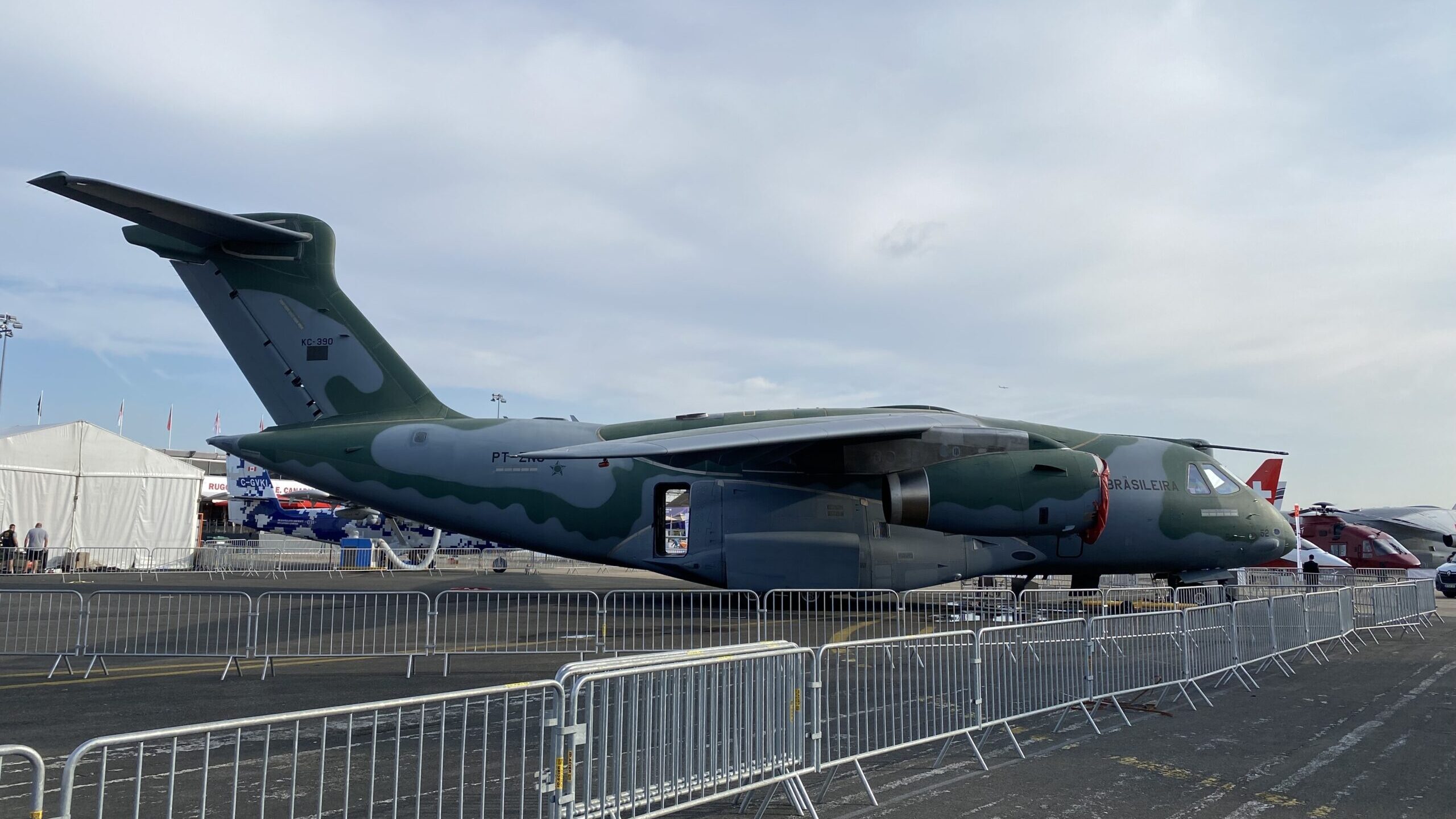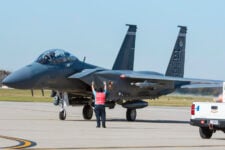
The Embraer-made C-390 Millennium, in Brazilian Air Force livery, seen at the 2023 Paris Air Show. This was actually one of two C-390s on display, with one from the Portuguese air force located nearby. (Aaron Mehta/Breaking Defense)
BEIRUT— Saudi Arabia Military Industries (SAMI) today announced plans to join forces with Brazilian defense giant Embraer to cooperate in the defense and security related aerospace sector, including on Embraer’s signature C-390 transporter.
In the Embraer announcement, the company said the agreement aims “towards expanding the operational footprint of both companies in the Kingdom of Saudi Arabia, with a focus on promoting the capabilities of the C-390 Millennium aircraft and delivering support to the kingdom’s Ministry of Defense,” the firm said in a statement.
It’s not the first sign that there is interest in the C-390 from the Saudis. In July 2022, Embraer and BAE Systems signed a Memorandum of Understanding to help push C-390 transport aircraft in KSA. However, no deal has yet come from that, and the Saudis continue to rely on its fleet of US-made C-130H /J military transporters.
A major emphasis of the Embraer statement is that it will help to establish a maintenance facility for Embraer aircraft in the Kingdom. This aligns with Saudi Arabia’s Vision 2030, which pushes to localize 50 percent of defense production in the Kingdom, and that has been evident so far through maintenance and integration works.
RELATED: SAMI exec on Saudi Arabian localization push, Turkish deal prospects and future plans
The firm’s statement added that “both companies will explore a Regional MRO Hub and a final assembly line for the Embraer C-390, as well as a mission system integration in the Kingdom. Furthermore, SAMI and Embraer will engage in training activities, which will enable the opening of new opportunities for both companies across the aerospace sector in the Kingdom and the region.”
SAMI CEO Walid Abukhaled said: “This growth in our business scope and capabilities highlights SAMI’s dedication to advancing and supporting the development of the aerospace ecosystem in the Kingdom. It is another important step in SAMI’s efforts in supporting the Saudi Vision 2030.”
He highlighted that while expanding SAMI’s MRO capabilities is important, the target is to establish joint training activities to develop Saudi talents and transfer skills in the sector.
Embraer’s defense and security CEO Bosco da Costa Junior said in a statement, “This is the first step to advance cooperation in Defense and Security involving production chains between the two countries. With this Memorandum of Understanding, Embraer advances further into a strategic market. We will work hard to add value to the local industry, to the Royal Saudi Air Force, and to the Kingdom of Saudi Arabia.”
Ryan Bohl, Senior Middle East and North Africa Analyst at the RANE Network, told Breaking Defense that this agreement is part of Saudi Arabia’s defense diversification strategy in which it’s trying to develop logistical support beyond the United States.
“The C-390 could serve as an alternative to American heavy lifters which is attractive to Saudi Arabia as it looks to lessen its reliance on American hardware and supply chains,” he said.
He added that for Brazil, a partnership with SAMI invites the potential of substantial investment into its defense industry, while Saudi Arabia may be able to gain technical know-how and an alternative supply chain that is less likely to be politicized than it’s supply chains that go through the United States or Europe.
Brazilian firms have been attractive to other Gulf countries such as United Arab Emirates, where its defense conglomerate EDGE has signed a handful of cooperation agreements with smaller Brazilian firms. But this agreement with SAMI is the first of its scale with Brazilian giant Embraer.
“I tend to think the reason that the UAE and Saudi Arabia are exploring opportunities in Brazil is in part because of its relatively neutral position in the global system,” Bohl commented. “Brazil has not taken strong stances on Ukraine, nor will it take a strong stance on China. It has very little to do with Iran or with Israel. It is a place where these two Gulf countries can explore developing alternative defense ties with a country that is not in a position to take a side in any potential major conflicts that may erupt in the future.”
He didn’t exclude the possibility that KSA and UAE may end up in some level of competition in Brazil in the future.
“But for now, I think that their ties to the defense industry there are nuanced and different enough that there’s no immediate concern that they will try to undercut one another,” Bohl concluded.
Australia tops up Ukraine military aid with $100M
Australia has already supplied Ukraine with 120 Bushmaster vehicles, six 155mm howitzers, 56 M113 armored vehicles, 14 special operations vehicles and its signature cardboard drones.


























